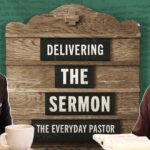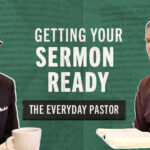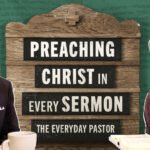On My Shelf helps you get to know various writers through a behind-the-scenes glimpse into their lives as readers.
I spoke with Sam Allbery—pastor, global speaker for Ravi Zacharias International Ministries, editor for TGC, and author of Is God Anti-Gay?, James for You, and Why Bother with Church?—about what’s on his nightstand, books he re-reads, books that have shaped his view of ministry, and more.
What's on your nightstand right now?
- Seasons on Harris: A Year in Scotland’s Outer Hebrides. This place stole my heart when I first visited a couple of years ago.
- Alexander McCall Smith’s The Woman Who Walked in Sunshine. I love that whole series.
- Tim Keller’s Making Sense of God and John Dickson’s A Doubter’s Guide to the Ten Commandments. Keller and Dickson are two of my favorite writers and apologists.
- I’m about to start Joseph Ellis’s The Quartet. I first visited the United States about 12 years ago and was given a tour of the Capitol in Washington. Initial confusion that it wasn’t the White House gave way to the realization that the founders really had a blank piece of paper and a country to figure out. I’ve been fascinated with the revolutionary period ever since.
- I’ve started but stalled (for now) George Marsden’s C. S. Lewis’s Mere Christianity: A Biography and Jonathan Haidt’s The Righteous Mind. I’m not great at finishing every book I begin, so I tend to wait till the next long flight to try to finish up the leftovers.

Also in the On My Shelf series: Ray Ortlund, Brett McCracken, Mez McConnell, Erik Raymond, Sandra McCracken, Tim Challies, Anthony Moore, Sammy Rhodes, Karen Ellis, Alastair Roberts, Scott Sauls, Karen Swallow Prior, Jackie Hill Perry, Bruce Ashford, Jonathan Leeman, Megan Hill, Marvin Olasky, David Wells, John Frame, Rod Dreher, James K. A. Smith, Randy Alcorn, Tom Schreiner, Trillia Newbell, Jen Wilkin, Joe Carter, Timothy George, Tim Keller, Bryan Chapell, Lauren Chandler, Mike Cosper, Russell Moore, Jared Wilson, Kathy Keller, J. D. Greear, Kevin DeYoung, Kathleen Nielson, Thabiti Anyabwile, Elyse Fitzpatrick, Collin Hansen, Fred Sanders, Rosaria Butterfield, Nancy Guthrie, and Matt Chandler.
Browse dozens of book recommendations from The Gospel Coalition’s leaders and sign up your church at Hubworthy.
Involved in Women’s Ministry? Add This to Your Discipleship Tool Kit.
 We need one another. Yet we don’t always know how to develop deep relationships to help us grow in the Christian life. Younger believers benefit from the guidance and wisdom of more mature saints as their faith deepens. But too often, potential mentors lack clarity and training on how to engage in discipling those they can influence.
We need one another. Yet we don’t always know how to develop deep relationships to help us grow in the Christian life. Younger believers benefit from the guidance and wisdom of more mature saints as their faith deepens. But too often, potential mentors lack clarity and training on how to engage in discipling those they can influence.
Whether you’re longing to find a spiritual mentor or hoping to serve as a guide for someone else, we have a FREE resource to encourage and equip you. In Growing Together: Taking Mentoring Beyond Small Talk and Prayer Requests, Melissa Kruger, TGC’s vice president of discipleship programming, offers encouraging lessons to guide conversations that promote spiritual growth in both the mentee and mentor.

































